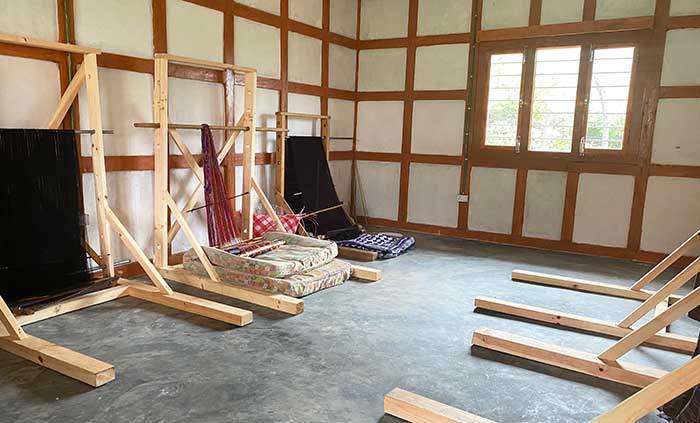Phub Dem | Paro
Driving down along the Chuzom-Haa highway, there are almost no signs that indicate whether one is approaching the Agro-based Open-Air Prison (OAP) in Dawakhang.
Forty-four female inmates with 15 children live in about 60 acres of land in Khamda, an agro-based open-air prison (OAP) in Dawakhang.
The inmates are living a healthy life. They send their children to ECCD, schools and earn their living.
Dechen’s (name changed) life began in jail. She was arrested for murder. She gave birth while serving the term.
Today, her 10-year-old son goes to school, and she earns a modest living. “I cannot think of raising my son in prison. My mistake shouldn’t deprive his basic right.”
She said that the OAP has been her home for the past eight years. She would remain there for another decade. “It’s like we are living on our farmland. We grow our food and learn various skills.”
To further enhance the inmates’ living standards, the Royal Bhutan Police inaugurated a child-friendly centre yesterday. The centre includes a child-friendly living area, classrooms for weaving, tailoring and a multi-purpose training hall.
The project worth Nu 4.6 million was funded by Save the Children, Bhutan country office.
The new centre can accommodate 24 inmates with their children.
Chief of Police Major General Chimi Dorji said the facility was to provide a conducive living environment for mothers and children, besides using the space for various rehabilitation and livelihood skill development.
Coinciding with the inauguration, a project to secure perennial water supply for the agro-based OAP was also launched.
The centre along with Naja and Dogar gewogs face severe water shortage for irrigation.
The water supply project aims to source the water through a 14-kilometre pipeline from Wangdi Se Ney-chu. It is expected to provide sustainable water for both the villagers and inmates.
The project is supported by UNICEF Bhutan and Rotary Club of Thimphu, to augment the sanitation of the inmates, especially during the pandemic.
The OAP, according to Chimi Dorji was aimed at equipping the inmates with livelihood skills, to generate saving and to rebuild their lives upon release.
As per RBP records, activities such as weaving and organic farming earn the inmates about Nu 0.4M. Moreover, the inmates engage in other activities, including weaving basket, knitting, making masks and non-formal education.
The agro-based OAP for women was first established in July 2013 under the command of His Majesty The King, as there was no female prison in the country. It was Druk Gyalpo’s solera to enable the convicts to cope with the stress they go through within the four walls of the prison.
Initially, there were 22 OAP centres in the country. With the completion of some projects, there are 12 OAP centres with 683 inmates as of today.
Since the inception of OAP, 1,292 inmates were released after serving the OAP tenure.
The police chief said that about 200 prisoners serving life term imprisonment were also given the opportunity to serve OAP under His Majesty’s command. “The inmates are currently engaged in Lingzhi dzong renovation.”
The male inmates are assigned to work for dzong and lhakhang renovation projects on the daily minimum wage of Nu 215, which allow them to earn and help them with spiritual healing.
Chimi Dorji said that with the introduction of OAP, the number of prison break and fights dropped drastically, as the criteria for the selection of OAP constitutes ethical conduct while in prison.


